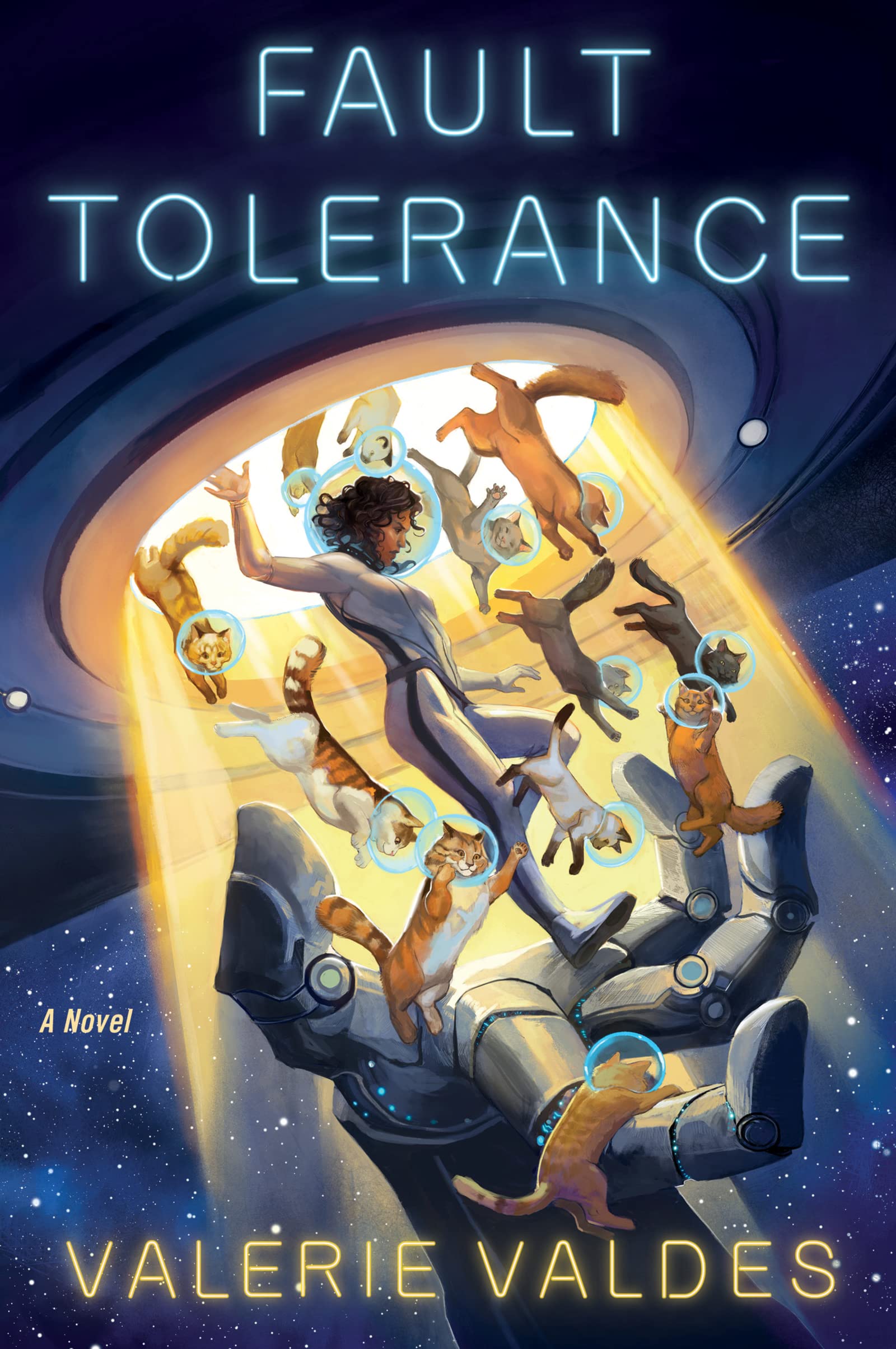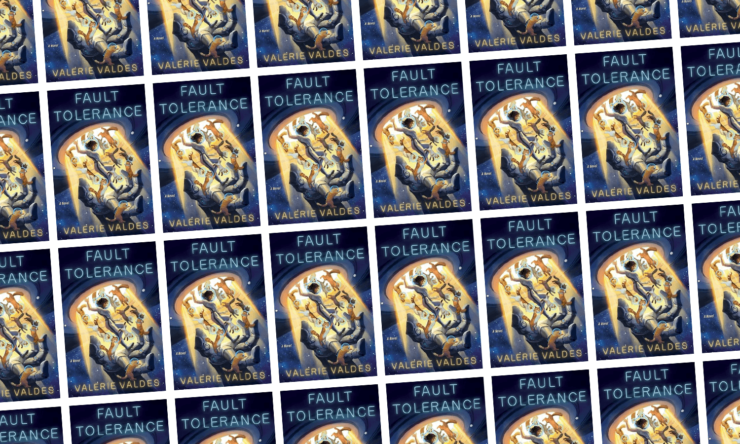Valerie Valdes’ Fault Tolerance, third in her stories of Captain Eva Innocente and her friends and family, brings the scrappy trader Captain her greatest challenge yet, with stakes are truly interstellar in scope.
Captain Eva Innocente and her crew’s prior adventures, Chilling Effect and Prime Deceptions, have always somewhat belied their covers: you’d think these novels were completely frothy and light space opera novels, fun but not particularly deep. The cute and cuddly cats on the cover just emphasize that. Cats in space, that has to be all sweetness and light. Right?
Not quite. While there is a lot of humor and fun to be found in the two novels there is a core of steel to each. Captain Eva has a checkered past (well, frankly, every one of her crew does) and throughout the first two novels, Eva has to come to terms with the things she has done, and who she was as a person then, and what she will do going forward. Her real family and her prior found families have shaped her and come back into her life, just like her new found family, the crew of La Sirena Negra, do now.
After shirking off an offer she could in the end refuse at the end of Prime Deceptions, Eva and her crew (but minus Vakar) are still hustling and trying to make a living. Valdes has a real gift for the in media res approach to opening her novels, dumping the reader into Eva’s latest troubles: entering into a grand melee for the hit show Crash Sisters. This high octane opening shows the lengths that Eva will go to keep herself and the crew solvent, and serves as an entree and stalking horse entry into the real plot. Hundreds of monoliths appearing simultaneously all over the universe, broadcasting a message to surrender or die. The fact that these monoliths are all near the interstellar gates that hold civilization together is the extra icing on the cake. Given Eva’s connections and entanglements with various interstellar agencies (the Fridge and the Forge) and her past misadventures, she finds herself mixed up in the race to confront the Monolith threat and who is behind it. Besides, if she doesn’t, then people from her past who might use this power for darker ends, like her former employer Tito, or say, her father, or the aforementioned feuding agencies might take advantage of the chaos.
Buy the Book


Fault Tolerance
Like the first two novels, Fault Tolerance swings back and forth from light and frothy to dark and gritty with a practiced gear shift at the controls. The novel likes to poke fun at Eva missing the presence of Vakar in a light moment, but then, shows the real life and rather bad consequences of what happens when Eva does think with her gut rather than her brain, in the pursuit of that personal goal. The novel never goes truly full on dark, but fluffy psychic cat antics can turn into daredevil race for the goal action beats with high stakes in a hurry in this novel.
For me, the novel is not that engaged in dialogue with other space opera novels so much as it is with other space opera and science fiction media. The biggest of these has to be the Mass Effect universe. The novel isn’t quite a love letter to that game, but it sure does scratches some itches and feels like it is in communion with that universe. This is especially seen in this third novel when the relationship between Eva and Vakar is a fully established thing, and given Vakar’s unusual species, one can’t help but think of a Femshep-Garrus relationship. Granted, Garrus would wrinkle his nose at the thought of the Quennian Vakar giving off different scents (especially licorice, when he is aroused). Having interstellar gates, an ancient civilization rising to subjugate all before it, and a interstellar polity of many planets and societies feels similar to Mass Effect too. La Sirena Negra may not be the Normandy (it is very much more the Millennium Falcon) but players of Mass Effect are going to find a lot of resonances here.
In that line, the ancient civilization conflict (in addition to the Reapers) also reminded me of a far older game in the same vein—Star Control 2. The plot of that game revolved around two factions of an alien species who contest dominance and mastery of the galaxy at intervals, with the loser going off to wander the galaxy for a while. In the time frame of the game, the Kohr-Ah are back to fight the Ur-Quan, and whoever wins, the rest of the galaxy loses (although conquest by the Ur-Quan might not be as immediately terrible as genocide by the more vicious Kohr-Ah). Like in this series (and specifically Fault Tolerance), the human commander cobbles together a found family of various people to come together to face a seemingly insurmountable threat, having adventures both light and dark along the way.
Valdes does a great job with having a crew and characters of all sorts of types in the novel, led by Eva herself. The days where a novel, or a video game, could assume a male human protagonist as the focus character seem positively paleolithic and hidebound in the glorious diversity of gender and queerness that IS the norm in Valdes’ universe. This is a universe that anyone can imagine themselves having a place within.
That goes not only for those axes, but culture as well. Too often, the default culture in a space novel is assumed to be American (or American-British) with all of the cultural baggage and assumptions that go with it. I am happy to report that Valdes’ novels fight against that overwhelming trend. Eva Innocente is bilingual (English and Spanish), which continues to show a multilingual approach to societies that still is uncommon to science fiction novels. Here, Eva swears and more in Spanish, eats and craves Cuban food, and in general shows that the future is not American hamburgers and beer all the way down. The parallel that comes to mind is the Imperials saga by Melinda Snodgrass, which has a distinctly Castilian Spanish color to the culture, from the Imperial family on down. In that universe, Hidden Worlds, separate from the Empire, show cultures at odds with the Spanish mainline, which looks distinctly odd by comparison, especially when one looks like what we would think of as American.
In the end, however, this is a novel of families and relationships both found and not found. Eva has to deal with both kinds and come to accommodations for all of her family. The novel is also strong on building and reinforcing those found families with interpersonal relationships whose navigation sometimes (okay more than sometimes) lead to thorny problems. Valdes’ books, including Fault Tolerance, feel lived in and with people to connect and bond with. The feelings that I get for the crew of La Sirena Negra felt like the moments Star Wars: A New Hope, between Tatooine and the wreckage of Alderaan, with Han, Chewie, Luke, Obi-Wan, R2D2 and C-3P0 living aboard the Millennium Falcon as a brief found family. Except, as noted above, it’s more diverse than all that, on all axes. I was also pleased that, after being somewhat sidelined and underused in the first two novels, the psychic cats of the series, who in a way were the inciting incident of the series but not much else, come into their own, including as characters.
Is this the end of Eva and her adventures? The ending is more Happy For Now rather than Happily Ever After, but after you do save the universe, where do you go? Eva is not settling down on a planet, as she says, she is happiest among the stars, but there does feel like there is a finality to the adventures we are going to be told.. They can take a breath and just exist for while without having to save the universe or other such for a while. What Valdes does next after this will be very intriguing, and very much to my taste and interest.
Fault Tolerance is published by Harper Voyager.
Read an excerpt here.
An ex-pat New Yorker living in Minnesota, Paul Weimer has been reading sci-fi and fantasy for over 30 years. An avid and enthusiastic amateur photographer, blogger and podcaster, Paul primarily contributes to the Skiffy and Fanty Show as blogger and podcaster, and the SFF Audio podcast. If you’ve spent any time reading about SFF online, you’ve probably read one of his blog comments or tweets (he’s @PrinceJvstin).










